#Cloud ERP software providers
Text
Cloud based ERP solutions solve many of the problems that are associated with traditional on-premises solutions and provide many advantages over their counterparts on-site.
#Business management solution#cloud based ERP solutions#Cloud ERP#Cloud ERP Software#Cloud ERP software providers#Cloud ERP solutions#cloud-based ERP solution#Cloud-based ERP systems#Comprehensive business management#Enterprise resource planning#ERP implementation partner
0 notes
Text
Elevate Efficiency with Top-tier ERP Software for Engineering Companies in Mumbai, India
Unlock unparalleled efficiency for your engineering company with ShantiTechnology's (STERP) advanced ERP software solutions. Tailored specifically for engineering companies in Mumbai, India, our ERP solutions redefine operational excellence. As one of the leading ERP solution providers in India, we bring you state-of-the-art technology to streamline processes, enhance collaboration, and boost productivity.
Experience the next level of business management with ShantiTechnology (STERP) – your trusted partner for cutting-edge ERP software tailored for engineering companies in India and specifically optimized for those in Mumbai.
#ERP software for engineering company#ERP software for engineering companies in India#ERP software for engineering companies in Mumbai#ERP solution providers in India#ERP software#ERP system#cloud ERP#ERP solutions#ERP India#Business Solutions#SAP Business One#Supply Chain Management
7 notes
·
View notes
Text
ERP Trends 2024: What Engineering and Manufacturing Industries Need to Know
As we navigate through 2024, the landscape of Enterprise Resource Planning (ERP) systems continues to evolve, presenting both opportunities and challenges for engineering and manufacturing industries. Companies in this sector, especially those in key industrial regions like Maharashtra, Mumbai, Pune, and Gujarat, must stay abreast of the latest ERP trends to maintain competitive advantage and operational efficiency. In this blog, we’ll delve into the significant ERP trends of 2024 and their implications for the engineering and manufacturing sectors.
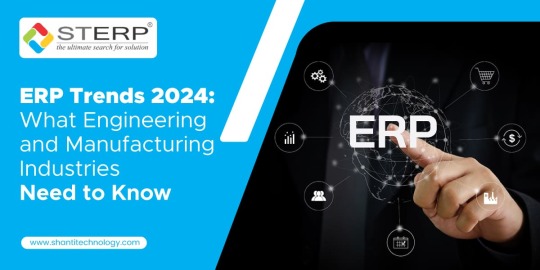
1. Increased Adoption of Cloud-Based ERP Solutions
One of the most significant trends in ERP software for engineering companies in Maharashtra and across India is the shift towards cloud-based solutions. Cloud ERP offers several advantages over traditional on-premise systems, including lower upfront costs, greater scalability, and enhanced accessibility.
Benefits of Cloud-Based ERP:
Cost Efficiency: Eliminates the need for expensive hardware and reduces IT maintenance costs.
Scalability: Easily adjusts to the growing needs of a manufacturing company in Gujarat or an engineering firm in Mumbai.
Accessibility: Provides access to real-time data from anywhere, facilitating better decision-making.
Leading ERP software companies in Pune are increasingly offering cloud-based solutions tailored to the needs of local engineering and manufacturing businesses. These solutions support remote work and ensure business continuity in an increasingly digital world.
2. Integration of AI and Machine Learning
Artificial Intelligence (AI) and Machine Learning (ML) are revolutionizing ERP systems by providing intelligent insights and automating routine tasks. For ERP software for engineering companies in Mumbai, integrating AI can enhance predictive maintenance, optimize supply chain management, and improve production planning.
AI and ML Applications in ERP:
Predictive Analytics: Helps foresee equipment failures and reduce downtime.
Supply Chain Optimization: Enhances demand forecasting and inventory management.
Process Automation: Automates repetitive tasks, freeing up human resources for more strategic roles.
ERP solution providers in Pune are at the forefront of integrating AI and ML into their systems, enabling companies to leverage advanced analytics and improve overall operational efficiency.
3. Emphasis on Cybersecurity
With the increasing digitization of manufacturing processes, cybersecurity has become a critical concern. ERP systems, being the backbone of business operations, are prime targets for cyber-attacks. Engineering and manufacturing companies in regions like Gujarat and Maharashtra need robust cybersecurity measures to protect their sensitive data.
Key Cybersecurity Features:
Data Encryption: Protects data during transmission and storage.
Multi-Factor Authentication: Enhances user authentication processes.
Regular Security Audits: Ensures continuous monitoring and improvement of security protocols.
ERP software for engineering companies in Maharashtra must incorporate these advanced security features to safeguard against data breaches and cyber threats.
4. Enhanced User Experience (UX)
User experience has become a critical factor in ERP adoption and utilization. Modern ERP systems are focusing on intuitive interfaces and user-friendly designs to ensure that all employees, regardless of their technical expertise, can effectively use the system.
UX Improvements:
Intuitive Dashboards: Provide real-time insights and easy navigation.
Mobile Accessibility: Ensures that users can access ERP data on-the-go.
Customization Options: Allow users to tailor the system to their specific needs.
ERP software companies in Pune are prioritizing user experience in their solutions, making it easier for engineering and manufacturing firms to train their staff and increase productivity.
5. Internet of Things (IoT) Integration
The integration of IoT with ERP systems is another trend transforming the manufacturing industry. IoT devices collect vast amounts of data from production lines, equipment, and other operational areas, which can be analyzed by the ERP system to optimize performance.
IoT Benefits in ERP:
Real-Time Monitoring: Provides immediate insights into production processes.
Predictive Maintenance: Schedules maintenance activities based on equipment condition rather than time intervals.
Enhanced Quality Control: Monitors product quality throughout the manufacturing process.
For ERP for manufacturing companies in Gujarat, IoT integration offers a significant advantage by improving efficiency and reducing operational costs.
6. Sustainability and Green Manufacturing
Sustainability is becoming a critical focus for manufacturing companies worldwide. ERP systems are evolving to support green manufacturing practices by tracking and optimizing resource usage, reducing waste, and ensuring compliance with environmental regulations.
Sustainable ERP Features:
Resource Management: Tracks energy and material usage to minimize waste.
Regulatory Compliance: Ensures adherence to environmental laws and standards.
Sustainability Reporting: Provides detailed reports on sustainability metrics.
Engineering and manufacturing companies in regions like Mumbai and Maharashtra can benefit from ERP solutions that incorporate sustainability features, helping them achieve their environmental goals and enhance their corporate reputation.
7. Modular and Flexible ERP Solutions
In response to the diverse needs of engineering and manufacturing firms, ERP solution providers in Pune are developing more modular and flexible ERP systems. These systems allow companies to select and implement only the modules they need, which can be easily scaled and customized as their business grows.
Advantages of Modular ERP:
Cost-Effective: Pay only for the features you need.
Scalability: Easily add new modules as your business requirements evolve.
Customization: Tailor the system to fit specific operational needs.
This trend is particularly beneficial for small to medium-sized enterprises (SMEs) in the engineering and manufacturing sectors, enabling them to adopt ERP systems without the burden of high costs or complexity.
8. Focus on Customer-Centric Manufacturing
ERP systems are increasingly supporting customer-centric manufacturing practices, where production processes are aligned with customer needs and preferences. This approach enhances customer satisfaction and drives business growth.
Customer-Centric ERP Features:
Custom Order Management: Handles unique customer requirements and specifications.
Enhanced CRM Integration: Integrates with customer relationship management (CRM) systems for a holistic view of customer interactions.
Real-Time Order Tracking: Provides customers with real-time updates on their orders.
Manufacturing companies in Gujarat and engineering firms in Maharashtra are leveraging these customer-centric ERP features to improve their service levels and build stronger customer relationships.
9. Advanced Analytics and Business Intelligence (BI)
Advanced analytics and BI are becoming integral components of modern ERP systems. These tools provide deep insights into business operations, helping companies make data-driven decisions and improve performance.
Key BI Features:
Data Visualization: Converts complex data into easy-to-understand charts and graphs.
Dashboards: Offer a real-time overview of key performance indicators (KPIs).
Predictive Analytics: Forecasts future trends based on historical data.
ERP software companies in Pune are incorporating advanced analytics and BI capabilities into their systems, empowering engineering and manufacturing firms to gain a competitive edge through better insights and informed decision-making.
10. Globalization and Localization Support
As engineering and manufacturing companies expand their operations globally, ERP systems must support multiple languages, currencies, and regulatory requirements. Globalization and localization features are essential for companies operating in diverse markets.
Globalization Features:
Multi-Language Support: Accommodates users from different regions.
Multi-Currency Handling: Manages transactions in various currencies.
Compliance with Local Regulations: Ensures adherence to regional laws and standards.
ERP solution providers in Pune and other industrial hubs are enhancing their systems to support global operations, enabling companies to seamlessly manage their international business processes.
Conclusion
The ERP landscape for engineering and manufacturing industries is rapidly evolving, driven by advancements in technology and changing business needs. Companies in Maharashtra, Mumbai, Pune, and Gujarat must stay informed about these trends to leverage the full potential of ERP systems. By adopting cloud-based solutions, integrating AI and IoT, prioritizing cybersecurity, and focusing on sustainability, businesses can achieve greater efficiency, competitiveness, and growth in 2024 and beyond.
For engineering and manufacturing firms looking for the best ERP software for engineering companies in Maharashtra or ERP for manufacturing companies in Gujarat, it is crucial to partner with leading ERP solution providers in Pune who understand the unique challenges and opportunities in this sector. Embracing these trends will not only enhance operational efficiency but also drive innovation and sustainability in the engineering and manufacturing industries.
By staying ahead of these ERP trends, companies can position themselves for success in an increasingly digital and interconnected world. Whether you are an engineering firm in Mumbai or a manufacturing company in Gujarat, the right ERP system can transform your operations and pave the way for a prosperous future.
#ERP software in Vadodara#Manufacturing ERP software in Gujarat#ERP software companies in Vadodara#ERP software providers in Vadodara#ERP for manufacturing company in Gujarat#ERP software#ERP system#cloud ERP#ERP solutions#software development#engineering ERP#management software#engineering services#engineering industry
4 notes
·
View notes
Text
The Top Choice: Oracle Enterprise Resource Planning Cloud Service for Your Business Success
Are you searching for the best solution to streamline your business operations? Look no further than the Top Choice: Oracle Enterprise Resource Planning (ERP) Cloud Service. In today's fast-paced business world, organizations need a robust ERP solution to optimize their processes, enhance productivity, and drive growth. Oracle ERP Cloud Service, crowned as the best in the industry, offers a comprehensive suite of tools designed to meet the demands of modern businesses.
Why Choose the Best: Oracle Enterprise Resource Planning Cloud Service?
Oracle ERP Cloud Service stands out as the Best Option for businesses across various industries. Here's why:
Scalability: Easily scale your ERP system as your business grows, always ensuring seamless operations.
Integration: Integrate ERP with other Oracle Cloud services for a unified business platform.
Real-time Insights: Gain valuable insights into your business with real-time analytics, enabling data-driven decision-making.
Security: Rest easy knowing your data is secure with Oracle's advanced security features.
Frequently Asked Questions about the Best Choice: Oracle ERP Cloud Service
Q1: What modules are included in Oracle ERP Cloud Service?
A1: Oracle ERP Cloud Service includes modules for financial management, procurement, project management, supply chain management, and more. Each module is designed to optimize specific aspects of your business.
Q2: Is Oracle ERP Cloud Service suitable for small businesses?
A2: Yes, Oracle ERP Cloud Service is scalable and can be tailored to meet the needs of small, medium, and large businesses. It offers flexible solutions suitable for businesses of all sizes.
Q3: How does Oracle ERP Cloud Service enhance collaboration among teams?
A3: Oracle ERP Cloud Service provides collaborative tools that enable teams to work together seamlessly. Features like shared calendars, document management, and task tracking enhance communication and collaboration.
Conclusion: Empower Your Business with the Best ERP Solution
Oracle Enterprise Resource Planning Cloud Service is not just a choice; it's the Ultimate Solution for businesses seeking to optimize their operations. By harnessing the power of Oracle ERP, you can streamline processes, improve efficiency, and drive innovation. Don't let outdated systems hold your business back. Embrace the future with Oracle ERP Cloud Service and propel your business to new heights.
Ready to transform your business? Contact us today to explore the endless possibilities with the best ERP solution on the market.
#oracle#oracle erp#rapidflow#oracle erp cloud service#best erp solution#oracle erp service providers#business#business automation#oracle services#enterprise software#scalability#integration#rpa#market#erp
3 notes
·
View notes
Text
#ERP Services#ERP Development#ERP Software Development#ERP Software Development near me#ERP Software Development for Businesses#ERP Software Development in India#ERP development Process#ERP Development Company#ERP Development Services#ios app development company in noida#custom software development company in noida#software development company in noida#app development in noida#Cloud Consulting Services#Cloud Consulting Services in Noida#software development company in india#Mobile App Development Company#Mobile App Development Company near me#Cloud Consulting Services & Solutions#Cloud Consulting Services in India#Cloud Services#Cloud Strategy & Consulting Service#Cloud Managed Services#AWS cloud consulting services#Cloud Software Consulting Services#Amazon Cloud Consulting Services#Cloud Consulting Services India#Microsoft Azure cloud consulting services#Best Service cloud consulting providers#AWS Cloud Services
0 notes
Text
Why Businesses Should Choose a Cloud ERP Software Provider

In today's digital age, businesses need robust systems that can grow and evolve with their operations. Enterprise Resource Planning (ERP) solutions provide businesses with the tools to manage day-to-day operations, from accounting to supply chain management. However, with the rise of cloud technology, more companies are turning to cloud ERP solutions for better flexibility, scalability, and cost-efficiency. Whether you are looking for a cloud ERP software provider or seeking a cloud ERP solution provider, it is important to understand why this shift is critical for modern businesses.
The Rise of Cloud ERP Solutions
Cloud ERP solutions are gaining popularity for several reasons. Unlike traditional on-premises ERP systems, which require significant hardware investments and ongoing maintenance, cloud ERP systems are hosted on remote servers and accessed over the internet. This eliminates the need for costly infrastructure while offering more flexibility.
A reliable cloud ERP software provider will offer customizable solutions that meet the unique needs of your business, ensuring seamless integration with existing workflows. The scalability of cloud systems is a key advantage, allowing businesses to scale up or down as required.
Benefits of Cloud ERP Software in Singapore
Singapore has emerged as a hub for innovation and technology. As businesses in the region continue to grow and expand, the demand for efficient and scalable ERP solutions has increased. Choosing a cloud ERP software Singapore can provide businesses with localized solutions tailored to meet the specific challenges of the Singaporean market.
Cost-Efficiency: Cloud ERP systems generally operate on a subscription-based model, which means businesses only pay for what they use. This is particularly beneficial for startups and small businesses with limited resources.
Remote Accessibility: With cloud ERP, employees can access the system from anywhere, provided they have internet access. This enhances collaboration, especially for businesses with remote or distributed teams.
Real-Time Data: Cloud ERP solutions offer real-time data access, enabling businesses to make quicker, data-driven decisions that can enhance operational efficiency.
Choosing the Right Cloud ERP Solution Provider
Selecting the right cloud ERP solution provider is critical for your business’s success. Here are key factors to consider:
Customization Options: Every business has unique needs, and a one-size-fits-all approach won't work. Ensure that the provider offers customizable solutions tailored to your industry and specific requirements.
Security: Data security should be a top priority when choosing a cloud ERP provider. Ensure the provider follows industry-standard security protocols, including encryption and regular backups.
Integration Capabilities: The ERP solution should integrate seamlessly with your existing tools and software. This helps avoid disruptions and ensures a smoother transition.
Scalability: A cloud ERP system must grow with your business. Choose a provider that offers flexible solutions that can be scaled to meet your changing needs.
The Future of Cloud ERP in Singapore
As Singapore continues to position itself as a global leader in business and technology, the adoption of cloud ERP systems is expected to rise. A trusted cloud ERP software provider will play a crucial role in helping businesses manage their operations efficiently, reduce costs, and enhance productivity.
Cloud ERP is not just a trend; it’s the future of business operations. Traditional ERP systems are becoming obsolete due to their limitations, including the need for costly upgrades and maintenance. Cloud ERP, on the other hand, offers flexibility and continuous updates without any downtime.
Why Businesses Are Moving to Cloud ERP Solutions
Many businesses are making the switch to cloud ERP because of the long-term benefits it offers. Here are some of the top reasons:
Lower IT Costs: With cloud ERP, there’s no need for large upfront hardware investments or ongoing maintenance costs. Everything is managed by the provider, reducing the burden on in-house IT teams.
Faster Deployment: Unlike traditional ERP systems, which can take months to deploy, cloud ERP solutions are generally quicker to implement, allowing businesses to see benefits sooner.
Continuous Updates: Cloud ERP providers regularly update their software, ensuring your business always has access to the latest features and security enhancements without needing to schedule system downtime.
Conclusion
The transition to cloud ERP software is a game-changer for businesses looking to optimize their operations while minimizing costs. Whether you are considering a cloud ERP software provider or evaluating the benefits of cloud ERP software in Singapore, the advantages are clear: cost savings, flexibility, and real-time access to critical business data. Selecting the right cloud ERP solution provider is essential for maximizing the benefits of these systems and driving long-term business success.
Cloud ERP is more than just a software solution—it’s the future of business efficiency. Don’t get left behind; make the switch today and transform the way your business operates.
0 notes
Text
https://naviworld.com.sg/our-solutions/erp-cloud/
cloud erp software provider
Partner with a leading cloud ERP software provider. Benefit from scalable, secure, and flexible ERP solutions tailored to your business needs.
0 notes
Text
Easy ERP Hosting with Hosting Home
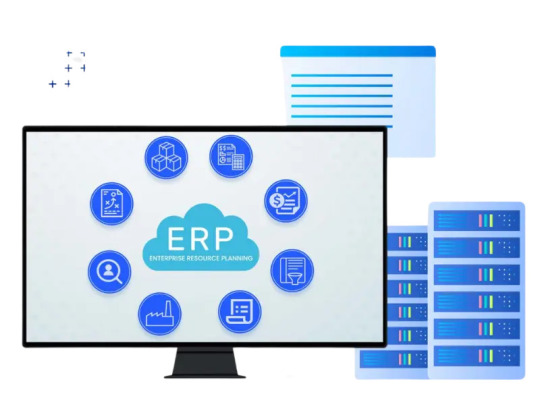
Choose Hosting Home for simple and reliable ERP hosting. Enjoy fast performance, dependable uptime, and supportive service to keep your system running smoothly.
#erp server#erp#erp software#erp system#erp tools#cloud erp#erps#erp web#erp hosting#erp hosting service#hosted erp solutions#hosting erp#erp hosting companies#erp hosting india#erp hosting price#erp hosting providers#erp server hosting#hosting erp systems#hosting for erp#hosting open erp#sap erp server#erp server cost
0 notes
Text
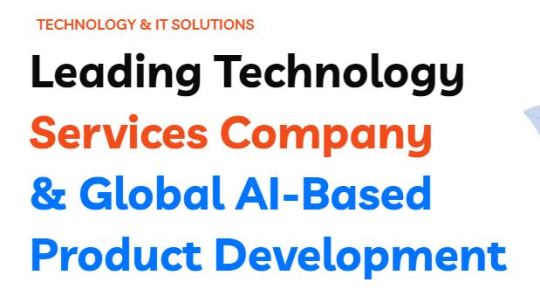
Tech Avtar is renowned for delivering custom software solutions for the healthcare industry and beyond. Our diverse range of AI Products and Software caters to clients in the USA, Canada, France, the UK, Australia, and the UAE. For a quick consultation, visit our website or call us at +91-92341-29799.
#software solution company#web based management system#Top Web development company in India#AI Chat bot company in India#Affordable software services Company#Top software services company in India#ai chatbot companies in india#Best product design Company in World#Best Blockchain Service Providers in India#Creating an AI-Based Product#best ai chat bot development platforms#Develop AI chat bot product for your company#AI Chat Bot Software for Your Website#Top Chatbot Company in India#Build Conversational AI Chat Bot - Tech Avtar#Best Cloud & DevOps Services#best blockchain development company in india#Best ERP Management System#AI Video Production Software#Generative AI Tools#LLMA Model Development Compnay#AI Integration#AI calling integration#Best Software Company in Banglore#Tech Avtaar#Tech aavtar#Top Technology Services Company in India
0 notes
Text
Navigating a Change of ERP Vendor: Key Considerations and Steps
In the evolving business landscape, having the right ERP vendor is critical. Sometimes, businesses must switch vendors to better align with their needs. This article explores the essential aspects of managing a change of ERP vendor.
Why Consider a Change of ERP Vendor?
The decision to change an ERP vendor is significant and often necessary. Businesses might seek a new vendor for better service, more advanced features, or cost-effectiveness. A change of ERP vendor can address issues such as poor support, lack of scalability, and outdated technology.
Signs It's Time for a Change of ERP Vendor
Poor Support: Inadequate customer support can hinder business operations.
Outdated Technology: An ERP system that does not keep up with technological advances can become a liability.
Scalability Issues: As businesses grow, their ERP needs change. If the current system cannot scale, it's time for a change.
High Costs: If maintaining the existing ERP system becomes too costly, finding a more cost-effective solution is prudent.
Benefits of Cloud ERP Software Providers
In recent years, many businesses have transitioned to cloud-based ERP solutions. A cloud ERP software provider offers several advantages:
Flexibility: Cloud-based systems can be accessed from anywhere, providing flexibility for remote work.
Cost-Effective: They reduce the need for extensive on-site IT infrastructure, cutting costs.
Scalability: Cloud ERP systems can easily scale with the growth of the business.
Regular Updates: Providers typically offer regular updates, ensuring the system remains current with the latest features and security protocols.
Steps to Change Your ERP Vendor
Changing your ERP vendor involves several critical steps. Here is a guide to ensure a smooth transition:
1. Assess Your Needs
Start by understanding why you need a change. Identify the shortcomings of your current system and what you need from a new vendor. This assessment will guide your decision-making process.
2. Research Potential Vendors
Look for vendors that specialize in your industry and can meet your specific needs. Consider their reputation, experience, and the range of services they offer. For example, if you need cloud solutions, find a reputable cloud ERP software provider.
3. Plan the Transition
Develop a detailed plan for the transition. This plan should outline the steps needed to migrate to the new system, the timeline, and how you will manage any potential disruptions.
4. Data Migration
Data migration is one of the most critical aspects of changing your ERP vendor. Ensure you have a clear strategy for transferring data from the old system to the new one. Data integrity must be maintained throughout this process.
5. Training and Support
Your team will need training to use the new system effectively. Choose a vendor that offers comprehensive training and ongoing support. This support ensures a smooth transition and long-term success.
Managing a Change of Dynamics NAV Vendor
If you are using Dynamics NAV and need to switch vendors, the process can be complex. Here's a specific guide for a change of Dynamics NAV vendor:
Identify the Need: Understand why you need a change. Common reasons include poor support, lack of customization, or high costs.
Select a New Partner: Look for a Dynamics NAV vendor with a proven track record. Consider their experience, client testimonials, and service offerings.
Plan the Switch: Develop a comprehensive plan for the transition. This plan should include timelines, key tasks, and a risk management strategy.
Data Migration: Ensure a smooth data migration process. Maintain data integrity and minimize downtime.
Training and Adoption: Train your team on the new system. Provide resources and support to ensure they can use it effectively.
Conclusion
Switching your ERP vendor is a significant decision that can impact your business's efficiency and growth. Whether you're considering a change of ERP vendor or a change of Dynamics NAV vendor, careful planning and execution are crucial. Evaluate your needs, research potential vendors, and develop a detailed transition plan. Opting for a cloud ERP software provider can offer added flexibility, scalability, and cost-effectiveness. By following these steps, you can ensure a smooth transition and set your business up for long-term success.
0 notes
Text
Navigating a Change of ERP Vendor: Key Considerations and Steps

In the evolving business landscape, having the right ERP vendor is critical. Sometimes, businesses must switch vendors to better align with their needs. This article explores the essential aspects of managing a change of ERP vendor.
Why Consider a Change of ERP Vendor?
The decision to change an ERP vendor is significant and often necessary. Businesses might seek a new vendor for better service, more advanced features, or cost-effectiveness. A change of ERP vendor can address issues such as poor support, lack of scalability, and outdated technology.
Signs It's Time for a Change of ERP Vendor
Poor Support: Inadequate customer support can hinder business operations.
Outdated Technology: An ERP system that does not keep up with technological advances can become a liability.
Scalability Issues: As businesses grow, their ERP needs change. If the current system cannot scale, it's time for a change.
High Costs: If maintaining the existing ERP system becomes too costly, finding a more cost-effective solution is prudent.
Benefits of Cloud ERP Software Providers
In recent years, many businesses have transitioned to cloud-based ERP solutions. A cloud ERP software provider offers several advantages:
Flexibility: Cloud-based systems can be accessed from anywhere, providing flexibility for remote work.
Cost-Effective: They reduce the need for extensive on-site IT infrastructure, cutting costs.
Scalability: Cloud ERP systems can easily scale with the growth of the business.
Regular Updates: Providers typically offer regular updates, ensuring the system remains current with the latest features and security protocols.
Steps to Change Your ERP Vendor
Changing your ERP vendor involves several critical steps. Here is a guide to ensure a smooth transition:
1. Assess Your Needs
Start by understanding why you need a change. Identify the shortcomings of your current system and what you need from a new vendor. This assessment will guide your decision-making process.
2. Research Potential Vendors
Look for vendors that specialize in your industry and can meet your specific needs. Consider their reputation, experience, and the range of services they offer. For example, if you need cloud solutions, find a reputable cloud ERP software provider.
3. Plan the Transition
Develop a detailed plan for the transition. This plan should outline the steps needed to migrate to the new system, the timeline, and how you will manage any potential disruptions.
4. Data Migration
Data migration is one of the most critical aspects of changing your ERP vendor. Ensure you have a clear strategy for transferring data from the old system to the new one. Data integrity must be maintained throughout this process.
5. Training and Support
Your team will need training to use the new system effectively. Choose a vendor that offers comprehensive training and ongoing support. This support ensures a smooth transition and long-term success.
Managing a Change of Dynamics NAV Vendor
If you are using Dynamics NAV and need to switch vendors, the process can be complex. Here's a specific guide for a change of Dynamics NAV vendor:
Identify the Need: Understand why you need a change. Common reasons include poor support, lack of customization, or high costs.
Select a New Partner: Look for a Dynamics NAV vendor with a proven track record. Consider their experience, client testimonials, and service offerings.
Plan the Switch: Develop a comprehensive plan for the transition. This plan should include timelines, key tasks, and a risk management strategy.
Data Migration: Ensure a smooth data migration process. Maintain data integrity and minimize downtime.
Training and Adoption: Train your team on the new system. Provide resources and support to ensure they can use it effectively.
Conclusion
Switching your ERP vendor is a significant decision that can impact your business's efficiency and growth. Whether you're considering a change of ERP vendor or a change of Dynamics NAV vendor, careful planning and execution are crucial. Evaluate your needs, research potential vendors, and develop a detailed transition plan. Opting for a cloud ERP software provider can offer added flexibility, scalability, and cost-effectiveness. By following these steps, you can ensure a smooth transition and set your business up for long-term success.
0 notes
Text
#Accounting Software In Dubai#Best Accounting Software In UAE#IT Infrastructure Services In Dubai#IT Services In Dubai#Managed IT Service Providers In Dubai#IT Support Companies In Dubai#IT Networking Solutions Company Dubai#Access Control System Suppliers In Dubai#Firewall Installation Services In Dubai#Accounting Software For Small Business In Dubai#Best Accounting Software Solutions In Dubai#Best Accounting Software For Medium Business In Dubai#Cheap Accounting Software For Small Business In Dubai#Best Cloud Based Accounting Software In Dubai#Best Low Cost Accounting Software For Small Business In Dubai#Best Accounting Software For Small To Medium Business In Dubai#Best Business Accounting Software Services In Dubai#Best Software Company In Dubai#Web Designing Services In Dubai#Best SEO Services In Dubai#Top HRMS Software In Abu Dhabi#Best ERP Solution Provider UAE#Best Project Management Software In Dubai#Fitness and Gym Management Software In Dubai#MEP Contracting ERP Software In Dubai#Best ERP Software For Metal Fabrication Industry In Dubai
0 notes
Text
ERP software for manufacturing industry | shantitechnology
Enhance your manufacturing business with STERP (shantitechnology), the best ERP software provider in India. Our ERP for manufacturing companies in Gujarat is specifically designed to streamline operations and boost efficiency. Whether you are in Rajkot or any other part of Gujarat, our ERP software for manufacturing industry solutions ensure your business stays ahead of the competition. As one of the top ERP software providers in India, STERP delivers cutting-edge technology and unmatched support.
Transform your business with STERP today and experience the future of enterprise resource planning!
#ERP for manufacturing company in Gujarat#Best ERP software provider in India#ERP for manufacturing company in Rajkot#ERP software for manufacturing industry#ERP software providers in India#India#Gujarat#Vadodara#Rajkot#Surat#ERP solution#cloud ERP
3 notes
·
View notes
Text
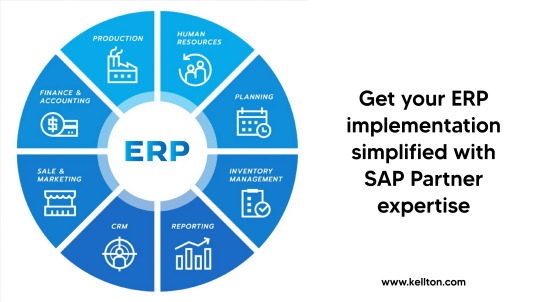
Unlock peak efficiency with our top-rated SAP service provider. Elevate your ERP solutions with expert guidance and cutting-edge technology. Let's optimize your business together.
#SAP service provider#enterprise solutions#business software#technology consulting#ERP implementation#SAP integration#industry-specific solutions#managed services#cloud migration#digital transformation
0 notes
Text
TRANSFORMING BUSINESS OPERATIONS WITH ACCNU ERP SOFTWARE

Discover the transformative power of cloud-based ERP software! Streamline operations, boost productivity, and drive growth with Emphorasoft's innovative solutions. Visit our website to unlock your business's full potential today! #ERPsolutions #cloudsoftware #productivity
https://accnu.in/transforming-business-operations-with-accnu-erp-software/
#erp solution provider#erp solution provider in Hyderabad#erp services in india#best erp partner in india#erp solutions in hyderabad#erp software companies in hyderabad#erp software providers in hyderabad#cloud erp for small business#cloud based erp for small business#best cloud erp for small business#best erp for saas companies#best erp partner in hyderabad#top erp solutions formsmes#erpsoltionsformsmes#BestERPSolutionProvider
0 notes
Text
Key Features of PMTRACK Manufacturing ERP Software
Table of Content
Why do Manufacturing Companies Need ERP?
Features of PMTRACK Manufacturing ERP Software
Conclusion
Manufacturing ERP (Enterprise Resource Planning) software and systems are a set of integrated tools used by the manufacturing industry to plan, manage, and offer certain features that help manufacturers and their businesses.
Manufacturing ERP is a centralised system that manages data from all stages of the manufacturing business process, from production to payroll. ERP software enables real-time decision-making while automating business processes and applications, resulting in a comprehensive business management platform for manufacturing sectors.
PMTRACK ERP offers the best all-in-one ERP Software for Manufacturing businesses. Our Manufacturing ERP software is specifically developed to connect core manufacturing business operations while lowering operational expenses for the manufacturing industry.
PMTRACK ERP is a Cloud-Based Manufacturing Software that boosts labour efficiency by providing integrated ERP solutions for manufacturing, MRP, BOM, production, planning, purchase, inventory, warehouse, sales, finance, CRM, HR & Payroll, and more.
Why do Manufacturing Companies Need ERP?
The manufacturing module in ERP packages can greatly help both small and large manufacturers.
An ERP tool is an excellent fit for every manufacturing business. ERP organizes and combines processes such as manufacturing, procurement, supply chain, and distribution.
Manufacturing ERP solutions improve production efficiency while also providing 360-degree visibility into day-to-day operations. With enhanced visibility, business stakeholders may better coordinate and collaborate.
Let us explore more about the benefits of PMTRACK Manufacturing ERP software.
Manufacturing Modules
Manufacturing modules are an essential element of the PMTRACK manufacturing ERP software. ERP software developed from materials requirement planning (MRP) to incorporate a variety of manufacturing-related modules such as inventory management, production management, and manufacturing execution systems.
Inventory Management
Every manufacturing company requires a sufficient inventory stock to manufacture demanded goods on schedule. PMTRACK manufacturing ERP software gives enterprises comprehensive control over their inventory and raw materials. The software gives producers real-time information about inventory levels and streamlines the stock order process.
Accounting and Finance
PMTRACK ERP software gives manufacturers access to accounting and finance modules that assist them manage their financial activities and accounts, helping them to increase profits and cut costs. Accounting and finance managers can use integration to assign the appropriate budget for raw supplies, labour, and transportation.
Production Planning
PMTRACK ERP software for manufacturing units enables you to plan and schedule production based on demand estimates, raw material availability, and production capacity restrictions. Additionally, you can receive real-time reports on manufacturing progress and capacity utilisation.
Automated Processes
ERP-driven automation enables manufacturers to automate manual procedures, reducing human effort and error. Manufacturing organisations can use technologically advanced software to automate a variety of activities, including procurements, sales invoicing, HR services, and more.
Sales and order management
Customers put orders for the things they require. These customer purchase orders become sales orders at the manufacturer. ERP directs operations to schedule work and buying to order the component supplies required to meet those client requests.
ERP also notifies sales management if the order is on schedule, giving them the opportunity to notify the customer if there is a risk. ERP records all needed transactions, which are linked to the sales order requirement. This enables intelligent reporting.
Business intelligence
BI (business intelligence) is an essential feature for any manufacturer. ERP systems monitor all transactions in any module. The time and date of the transaction, as well as who entered it, are recorded. These transactions provide the audit trail, which is an essential component of management control systems.
ERP also relies on configuration and setup records for each module. These may be basic settings for certain transactions. By default, the setting for a make-to-order firm will create links to sales orders. In contrast, a make-to-stock manufacturer will relate those defaults to inventory replenishment projections.
Customer relationship management
Your ERP system contains a customer relationship module, or CRM. This module includes capabilities for tracking all communications between a manufacturer and a customer. These communications can be verbal over the phone or in person. They might be simple advertising pieces sent via mail, digitally, or in any other format. A phone discussion may begin with a simple question, “How are things today?” and progress through multiple follow-ups to a quote and sales order.
Supply Chain and Distribution Management
Inefficient supply chains and distribution can cause delays in production and delivery of completed goods. PMTRACK manufacturing ERP software’s supply chain and distribution management capability can help track goods in real time across numerous supply chain channels. These channels include suppliers, manufacturers, distributors, retailers, and end users.
Conclusion
Manufacturing companies face numerous challenges when searching for a new ERP system. After comprehending the significance of these aspects, you realize that manufacturing ERP software is essential. ERP software in Pune, India, offers the best ERP software. As a premier ERP software vendor, they have specifically built to meet the special requirements of the manufacturing industry.
Manufacturing businesses must digitize and automate their operations in order to react to changing business environments and maintain a competitive advantage. PMTRACK ERP for manufacturing companies is a technologically advanced system that helps manufacturers achieve operational agility and process efficiency.
Furthermore, deploying this software assists in reducing your manufacturing company’s operational costs while increasing productivity. PMTRACK ERP, an outstanding ERP solution provider, offers the above-mentioned capabilities to help streamline manufacturing operations.
Are you looking for a trusted ERP implementation provider for your manufacturing business? you can contact us today with your business queries and details.
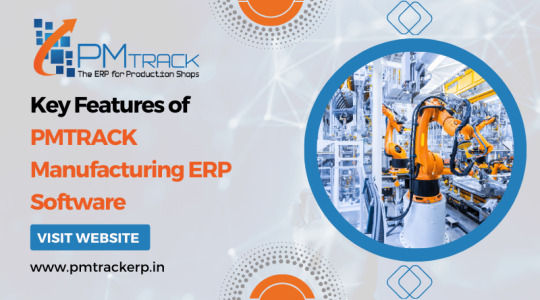
#ERP solution provider in Pune#ERP software in Pune#ERP for manufacturing companies#Manufacturing ERP software#Cloud-Based Manufacturing Software#ERP Software for Manufacturing Companies in Pune#Features of Manufacturing ERP Software
0 notes